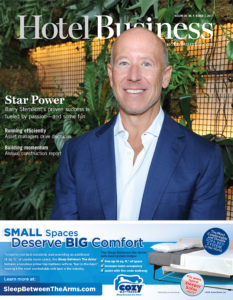NATIONAL REPORT—The role of asset manager is often a complicated one. With the industry continuing to see strong fundamentals, Hotel Business wanted to gain perspective on how asset managers are addressing their responsibilities in the current environment and what expectations are for the months ahead.
According to Erik Johnson, VP of Texas-based Benchmark Resorts and Hotels Owner Advisory Group, as the industry becomes more sophisticated and complicated, the role of an asset manager does as well. “With ever-increasing distribution channels, brand alternatives, revenue management needs and a changing customer base, the asset manager not only has to be current to be relevant, but should be in front of the trends in the industry and how they relate to the needs of the property owner,” he said.
Anjali Agarwal, EVP/asset management of The Chartres Lodging Group LLC in California, noted there are some key trends that necessitate “vigilant” asset-management oversight. “First, the increasing percent of revenues that are generated by third parties both on the transient and group front, which directly eats into bottom-line profit. Second, the aggressive growth of the sharing economy that has surfaced a new wave of competitors. Third, owners are at risk of rising pension-withdrawal liabilities, and union representatives are more aggressive in negotiating collective bargaining agreements. Property taxes in several markets are facing double-digit increases.”
For CHMWarnick’s Managing Director/EVP Jalil Mekouar, the role of asset manager has “certainly not” become less complicated.
“It is all about maximizing RevPAR market share (not only occupancy) in an increasingly competitive environment and minimizing costs without jeopardizing the guest experience and value in an environment where labor expenses, customer acquisition costs and other costs are increasing,” he said. “It is getting more complicated for asset managers to ensure that most of the additional revenue generated flows to the bottom line and to make sure ownership’s slice of the pie doesn’t shrink before its eyes.”
Michelle Russo, CEO of hotelAVE, noted hotels have always had a lot of moving parts. “They are real estate with a business inside that effectively markets, manufactures and distributes a perishable product every day,” she said, observing each of those disciplines has become more complex. “Marketing must be one-to-one; the one-to-many approach that was acceptable five to 10 years ago is ignored by consumers today,” she said.
While agreeing the role is not less complicated, Richard M. Niedbala, SVP/asset management, Lodging Capital Partners LLC, sees a shift in focus. “Where we had been focused on making the larger corrections, such as renovations, brand changes and management changes that lead to accelerated levels of stabilization, we now find ourselves focused more on fine tuning the operations with our managers. That generally involves much more critical analysis of pricing, expenses and new ideas to drive profitable revenue,” he said.
Similarly, Matthew Arrants, EVP, Pinnacle Advisory Group Inc., noted that his company’s current focus is to take a “defensive posture” to revenues and expenses.
With such a thriving environment, it wouldn’t be surprising to find owner expectations rising around ROI, RevPAR, NOI, etc. While Johnson doesn’t see that happening, he does see owners keeping a closer eye on, for example, penetration index goals and achievement, return on property capital investments and brand contribution.
Agarwal said Chartres is always a strong advocate of ROI projects that can demonstrate attractive returns, “particularly those with a quick payback so that we can meaningfully impact performance in the near term. The healthy cash flow generated by this environment certainly increases our appetite for spending on ROI-generating projects.”
CHMWarnick’s Mekouar noted for many hotel investors, the name of the game is to “get in as low as possible, maximize returns and get out as high as possible. So owner expectations tend to be exponential rather than linear and ‘reality check’ conversations are critical to maintaining focus on mitigating risks and maximizing returns.”
Jeffrey W. Dugan, COO/SVP at Nebraska-based Condor Hospitality Trust, observed reality checks have started to become conversation points, but with the information coming from STR, PwC and other outlets in terms of things slowing, “the expectation is that all performance metrics should remain in a growth mode, even in spite of increasing supply. The ability for the industry to absorb supply the last several years has created a false sense of security with owners.”
“The major disconnect is not in the industry fundamentals but in the bid-ask pricing on hotel real estate transactions,” said Russo. “Many sellers could not get their desired pricing in 2016, so value-add opportunities are central to these discussions in this new cycle. Asset management is taking center stage as owners and all participants in the capital stack are laser-focused on business-plan initiatives that will create additional value beyond market growth.”
Owner expectations are always subject to their overall goal and, to a degree, in what part of the cycle they acquired the asset, added Niedbala. “Owners with shorter investment horizons usually have much more ambitious attitudes with respect to performance and will encourage aggressive actions,” he said. “There are few owners in the industry who do not understand market cycles.”
Or, as Pinnacle’s Arrants said: “Uninformed owners are dangerous.”
There’s any number of cost concerns for asset managers in 2017, including a few “hot buttons” that have emerged over the past several years.
Benchmark’s Johnson offered on a property-by-property basis, the need to ensure total revenue management tools and practices are in place is critical and the ability to predict market conditions a requirement.
“On a broader scale, in certain markets there are supply concerns. In others, the value of the dollar over the next five years could reshape the international tourism market. Airbnb and related offerings that affect supply are already a concern and will not go away,” said Johnson. “Minimum-wage law changes nationally and locally will affect margins and will not be offset by rate gains. The unknown changes in the health-care laws also could have an effect on benefit cost nationally.”
“My biggest cost concerns are the increased third-party commissions, payroll and property taxes,” said Chartres’ Agarwal. “The most pressing hot button we are experiencing currently is the precipitous decline in leads from Global Sales for our Starwood properties following the Marriott acquisition and the overall uncertainty surrounding the transition. While I expect the strength of the Marriott engine to be positive in the long term, it is going to take approximately two years for the transition to be complete and the near-term disruption to Starwood properties is concerning.”
CHMWarnick’s Mekouar cited labor costs and the potential for increases in union activity. “Customer acquisition costs and ‘brand’ costs (including loyalty program direct and indirect costs and system costs) are areas to keep a close watch on,” he said.
His CHMWarnick colleague, SVP Larry Trabulsi, noted the company would continue to be “laser-focused on not increasing a hotel’s fixed-cost structure, even with volume (occupancy) at record highs. For example, for most of our hotels, the 2017 budget process focused on not adding new management or supervisor positions. Additional focus is on job-sharing and cross training, so that hotels can maximize flexibility and keep solid talent fully employed during a slowdown.”
Along similar lines, Condor’s Dugan suggested labor and guest acquisition costs continue to create pressure on NOI. “And it does not appear to be slowing. While the declining unemployment rate is good for business in terms of revenues, it is also creating pressure on wages. The competition is not only coming from within the industry but also outside industries that are also feeling the pinch of labor challenges. Guest acquisition costs, especially in the SMERF markets, show no signs of slowing as well,” he said.
From Russo’s perspective, revenue intermediaries, the impact of Airbnb as new supply, managing labor-related costs and specialized brands and their sustainability relative to their target audience are among concerns for the hospitality industry.
At Pennsylvania-based GF Hospitality, SVP/Development Jeffrey Kolessar said increasing distribution costs continue to be the company’s major concern. “Particularly as we look forward to a near future with shrinking RevPAR growth across many markets,” he explained. “Delivery costs need to be constrained, and franchisors must use an ownership lens when negotiating partnerships and instituting strategic shifts in price positioning. Member rates are a good example, for while brands tout their success in membership reservations and loyalty, we must examine how the revenue impact is being shared by the individual hotel owners and the franchisor.”
Lodging Capital Partners’ Niedbala suggested labor and related costs “have probably demonstrated the most dramatic changes and increases in recent years. Couple that with the ever-increasing cost of acquiring business related to the various websites, meeting and travel planners and other intermediaries that continue to evolve and the operating cost challenges across the board continue to challenge asset managers and owners.”
“If you asked me in October, I would have told you I was worried about labor costs related to increased government regulation,” said Pinnacle’s Arrants. “Now, I worry about labor costs associated with reduced supply.”
To find out what else is on the minds of these asset managers, check out HB’s website for additional coverage. HB


